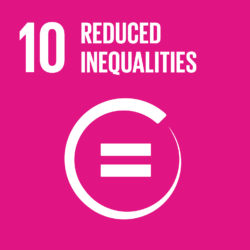
Why We Need Reduced Inequalities

When you were younger you were probably told many time that “Life isn’t fair.” This is very true and to a degree you probably can’t fully understand when you’re a kid and the world is much smaller.
Although life isn’t fair we all have a responsibility to do what we can to limit injustice and reduce inequalities.
This, of course, is a battle that has long been fought by the human race. If you look over our history you will see numerous rebellions, wars, protests, civil movements, etc., all done in the name of equality.
So what makes modern society different? Why are we in a place where we can truly make a solid impact and achieve a more equal world?
Let’s look at that question this week.
To start off let’s look at the effects of an unequal society and world.
You’ve probably heard many of the statistics: The top 1% hold 45% of the world’s wealth (and 42.5% in the U.S.), the richest billionaires hold more wealth than most countries and the wealthiest 85 individuals hold more wealth than the bottom 50% of the world’s population combined.
This obviously isn’t fair but the effects of the inequalities go beyond the size of our bank accounts. Side effects of lower income include lower levels of mental health, higher levels of stress and increased political instability and crime. There are even strong links between the growth of both income inequality and climate change.
As income inequalities grow so does our world’s suffering. Humanity and society benefit when the playing field is set up more fairly for the players. It’s time for all of us to work towards the creation of a more just world.
The first area to explore when analyzing income inequality and the path to its reduction is education.
Income inequality is closely linked to educational inequality and neither evil will probably ever be reduced without a proper solution to the income-achievement gap.
Lower-income students face barriers not experienced by those in higher-income brackets and these barriers make it much harder for them to complete their studies (if they even get to start them), keeping them in a disadvantaged state and making it incredibly hard to improve their economic standing.
This is a universal problem although it’s doubtful there is a universal solution.
At the root of it all is the notion of opportunity. Every child deserves opportunity. I think it’s understood that depriving them of any education is taking away that opportunity, but limiting the educational opportunities of certain segments is a less noticed evil.
The solutions needed cover many areas. We need education models that properly address the gender gap as well as the income gap. We need education models that look beyond the structured classroom and embrace modern innovations. We need funding that actually (and equally) addresses and covers the costs for all students.
This may prove to be a tough battle but it is definitely one that needs to be fought. A better world is a fairer world and this includes giving everyone equal access to the tools needed to succeed.
Another area rife with inequality that needs highlighting and improving is migrant workers and migrant remittances. Today’s economy is run on the backs of thousands of migrant workers who emigrated and took on jobs to support loved ones in less developed nations. Last year 466 billion dollars were sent via remittances, an all-time high.
But how have our financial systems been managing these transfers?
Our old method was not ideal as the cost is a major negative aspect of remittances, reducing the amount of money that reaches its recipients. In fact one of the SDG’s goals is to reduce the transaction costs involved in the process.
There are innovators helping to achieve this goal and modern technology is definitely proving to be an asset.
Take SureRemit as an example. Its 0-2% remittance fee is much lower than typical providers and, as it’s operating on a blockchain system, the transfers will be quick and secure. Not only that, the company aims to ensure that the recipients of these transfers can easily ensure the money gets used for its intended purpose.
We need to do everything we can to ensure we have a solid remittance system and it’s good to see FinTech is blazing the trail to a better future.
Sustainable Development Goal #10 is something everyone should agree we need: reduced inequalities.
So many people are already geared up to wage this war, as the Occupy (Wall Street et al.) movements and the Bernie Sanders wave have shown.
The question then becomes: how do we best tap into this thirst for justice and ensure the steps we’re taking to reduce inequalities don’t get lost in a backslide?
We need the masses to come together and support income equality and we need technology to help ensure it stretches across the globe. We may be at the highest level of inequality in our time on this earth but we also have the tools and resources to make a real difference. Let’s get to it.

